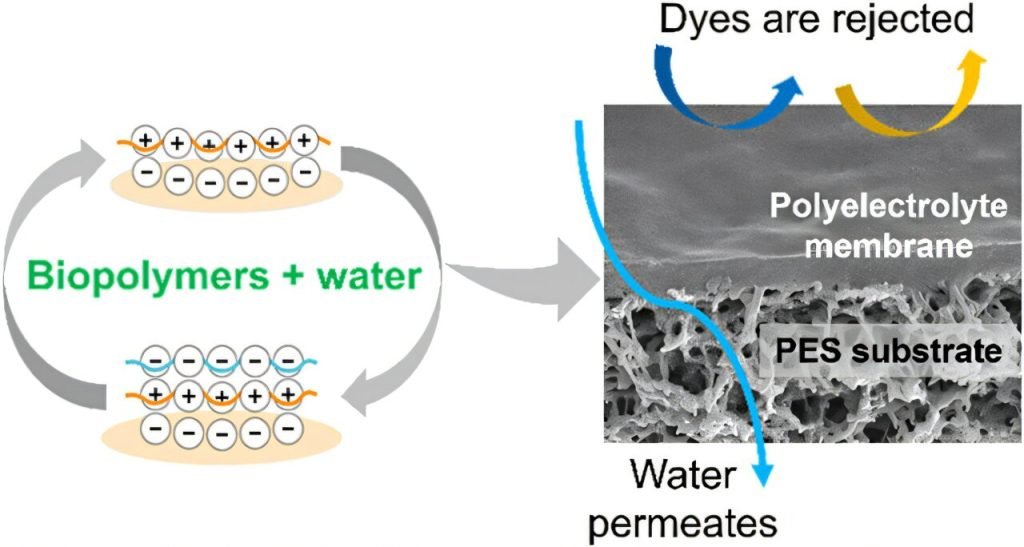
They are used in cleaning our drinking water, treating sewage, processing foods and keeping pharmaceuticals safe—membranes are a crucial part of everyday life.
Now, chemical engineers at the University of Bath have made an effective and more sustainable plant-based nanofiltration membrane, which—in a world first—does not use fossil fuel-derived materials or toxic solvents.
Made from two renewable and sustainable plant-derived materials—cellulose and lignin—the new polyelectrolyte membrane (PEM) design has been proven in testing to effectively filter water dyes of a range of different molecular weights, which are used to represent different pollutants’ sizes.
The technology could be used in fields including water purification and wastewater treatment, replacing existing equivalents that use fossil fuels in their production.
The results are detailed in a new research paper, “Lignin- and Cellulose-Derived Sustainable Nanofiltration Polyelectrolyte Membranes,” published in ACS Sustainable Chemistry & Engineering.
Dr. Olawumi Sadare, a Royal Society Newton Fellow in Bath’s Department of Chemical Engineering, and co-author of the paper, said, “The potential of this technology to reduce environmental impacts is particularly crucial, especially in light of upcoming EU legislation to curb the use of toxic solvents, and the proposed bans on fluorinated polymers in membrane manufacturing.
“Another desirable aspect of the membrane we have created is that you can control its thickness as you wish to tune the permeance characteristics, or how selective it is.”
The membrane also demonstrated excellent stability and performance after 30 days in water, proving its durability.
Professor Davide Mattia, from Bath’s Center for Integrated Materials, Processes and Structures, co-authored the research paper. He said, “Chemical separations consume 10%–15% of the world’s energy, and membranes are considered the most promising technology to dramatically reduce the carbon footprint of these vital processes.
“As such, the focus has always been on improving membrane performance, with little attention paid to the impact of their manufacturing. All commercial membranes manufactured today use toxic organic solvents and fossil-fuel derived materials, particularly polymers.
“These not only emit carbon to manufacture them but also cannot be recycled and end up in a landfill. The approach we developed focuses on making membrane manufacturing sustainable, while producing a membrane that has comparable performance to commercial ones.”
The research team includes Dr. Olawumi Sadare, Dr. Liana Zoumpouli, Prof John Chew, Dr. Jannis Wenk, Dr. Bernardo Castro-Dominguez and Prof Davide Mattia.
The researchers have applied for patent protection for the technology and are taking steps toward commercializing the membrane. Future research will focus on further testing the membrane’s performance in water treatment, and in the removal of PFAS forever chemicals.
More information:
Olawumi Sadare et al, Lignin- and Cellulose-Derived Sustainable Nanofiltration Polyelectrolyte Membranes, ACS Sustainable Chemistry & Engineering (2025). DOI: 10.1021/acssuschemeng.4c08611
Citation:
Sustainable plant-based membrane works without fossil fuel materials and toxic solvents (2025, February 4)
retrieved 4 February 2025
from https://phys.org/news/2025-02-sustainable-based-membrane-fossil-fuel.html
This document is subject to copyright. Apart from any fair dealing for the purpose of private study or research, no
part may be reproduced without the written permission. The content is provided for information purposes only.






